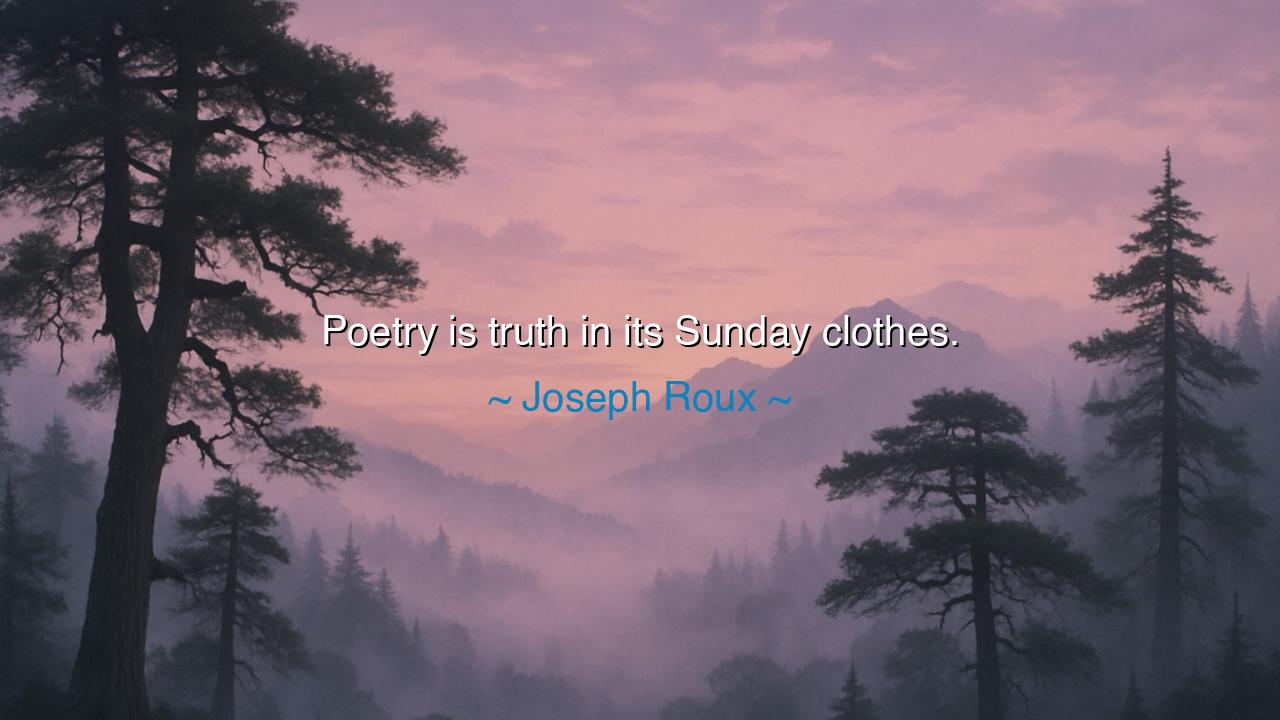
Poetry is truth in its Sunday clothes.






The words of Joseph Roux fall upon the heart with a gentle yet piercing beauty: “Poetry is truth in its Sunday clothes.” In this simple yet profound image, Roux reveals the nature of poetry as the adornment of truth, not to conceal it, but to elevate it. Just as a person clothes themselves in their finest garments for the sacred day of rest, so does truth, when expressed in poetry, clothe itself in rhythm, in imagery, in grace. Naked truth can be raw and jarring, but when it is dressed in the garments of poetry, it shines with dignity, making the heart receptive to its power.
The ancients, too, knew this principle. When the bards of Greece sang the Iliad or Odyssey, they were not merely recounting events of war and wandering. They were clothing truths about honor, mortality, loyalty, and fate in the garments of verse, so that the listener might be drawn into wonder and awe. The Sunday clothes of poetry—its rhythm, its metaphor, its beauty—were not frivolous decoration, but sacred vestments that made truth endure. For bare fact is forgotten, but truth clothed in poetry lingers in the memory of generations.
Consider the Psalms of Israel, sung in temples and carried across millennia. Had they been recorded as plain commands or facts, they would not have stirred the soul. But clothed in poetry—“The Lord is my shepherd, I shall not want”—they have remained eternal. Here we see Roux’s wisdom made flesh: truth becomes most powerful when it is clothed in beauty, when the garments of poetry give it form that both mind and heart can embrace.
And yet, Roux’s words are not to suggest that poetry hides truth. No, it does the opposite: it reveals it more deeply. Just as the garments worn on holy days are not masks but signs of reverence, so too is poetry a reverent dressing of reality. It elevates what is ordinary, allowing us to glimpse eternity in the passing moment. Through poetry, love is not only described—it is exalted. Through poetry, sorrow is not only felt—it is sanctified. Thus truth in poetry becomes truth remembered, honored, and adored.
History shows us the power of this. When Abraham Lincoln delivered the Gettysburg Address, his words were clothed not in length or complexity, but in simplicity and rhythm: “government of the people, by the people, for the people.” It was not mere rhetoric; it was poetry, truth in its Sunday clothes, so powerful that those words still march across the centuries. His truth—that democracy must endure—was adorned in language that sanctified it, ensuring it would live long after the guns of war fell silent.
The lesson is clear: if you wish to make truth endure, clothe it in beauty. Do not be content with facts alone, for facts may inform but seldom transform. Let truth be shaped into stories, into songs, into verse, so that it may touch not only the mind but also the soul. Poetry is not deception—it is truth honored, truth exalted, truth prepared to meet the human heart in its fullest strength.
Practical actions follow: when you speak of what matters, choose words that carry beauty as well as clarity. Read poetry, for it teaches you how truth may be clothed in rhythm and grace. When you write or speak of your own experiences, do not fear to shape them into images and metaphors, for in doing so, you will honor them. And in your daily life, remember Roux’s wisdom: truth deserves reverence. Clothe it in care, speak it with love, and let it shine in the garments of beauty, so that others may recognize its power.






TQGiang Hoang Thi Quynh
This quote makes me think about how poetry elevates truth in a way that makes it more palatable, even when it’s difficult to confront. But does this mean poetry always softens the harshness of truth? Can poetry still be an effective way to express raw or difficult truths, or does it risk obscuring them in the pursuit of beauty? How do you think poetry can balance truth with artistic expression?
8NGia Bao 8\1 Nguyen
Joseph Roux’s quote about poetry suggests a certain formality or reverence to truth when it is presented in poetry. Does this mean that poetry is less about raw expression and more about thoughtful representation? Is there a danger that poetry, in its refinement, might lose the immediacy and authenticity of the truth it seeks to communicate? How do we balance artifice and authenticity in poetry?
XPhoang xuan phat
The idea that poetry is ‘truth in its Sunday clothes’ is intriguing. It makes me think of how we dress up our thoughts and emotions in poetry, making them more digestible or accessible. But does this dressing up ever dilute the truth, or does it allow it to be more deeply understood? How do you feel about the balance between presenting a polished version of truth and leaving it raw or unrefined in poetry?
PNPhuc Ngo
Roux’s description of poetry as ‘truth in its Sunday clothes’ feels like a poetic paradox. Truth is often raw and unvarnished, yet poetry wraps it in a more delicate or elegant form. Is poetry always an idealized version of reality, or can it also present the truth in its messier, more uncomfortable form? How do you think this contrast between truth and its presentation affects how we experience poetry?
TTThu Trang
Joseph Roux’s quote about poetry being 'truth in its Sunday clothes' seems to suggest that poetry presents the raw truths of life in a more refined or polished way. I wonder, is this what makes poetry so powerful—its ability to elevate the ordinary or difficult truths into something beautiful? Can this be said of all forms of art, or is poetry uniquely suited to this transformation of truth?